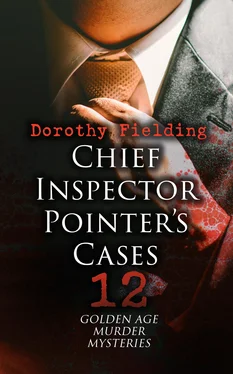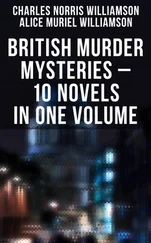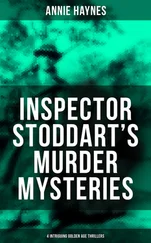"Never. But I telephoned Sunday afternoon and asked if I might come in early about three on Monday afternoon as there was something I wanted to talk over with her. She said that she would be at her dressmaker's at that hour. I suggested the next day, Tuesday, about five. She said that would suit her excellently, especially if I would come to tea. On Monday evening she rang me up to put off my coming indefinitely, saying she would write and make another appointment, but I was out, and the maid forgot to give me her message; so I went on Tuesday, expecting to see her."
"Do you remember just what she told the maid Monday evening over the 'phone?"
"Norton says that Mrs. Tangye said, 'Ask Miss Barbara not to come to-morrow as we arranged. I have a most urgent engagement that I can't put off. Tell her I'm so sorry. I'll write and explain.' But, as I say, the message wasn't given me until Tuesday night when Norton read of Mrs. Tangye's death in the evening papers. Meantime I started rather late for Riverview from Hampton Court Palace, where a relative lives." She gave the name. "I was driving our car myself; something went wrong. It's always leaving you in the lurch when you want to bustle along. There's a good garage not far from Riverview, you have to pass the house coming from Hampton Court." She gave its address. "That's when I saw Mr. Tangye leaving by the side gate. I went on to the garage and had a long wait there until some one came to whom I cared to hand over the car. Then I hurried on to Riverview, though it was nearly six. As I came to the tradesmen's gate I found Mr. Tangye had left it open. It cuts off a corner of the little drive, so I took it too. I walked around the clump of laurels this side of the morning-room to look in. I wondered if Mrs. Tangye had given me up. But through the curtains I saw that the light was on, and hurried back around to the front door. As I stepped away the curtain was pulled aside for a second, and some one—a woman—peered out between them. Perhaps she heard me on the path."
Barbara paused for half a second.
"It was Miss Saunders—I suppose," she added slowly. "Why suppose?" Wilmot asked.
"It was the most dreadful face I've ever seen," the girl said in a low voice. "The face of a ghoul. Malignant. Horrible. Gloating." She shuddered as it seemed to rise again before her.
"Did she see you?"
Barbara shook her head.
"She was looking in the opposite direction, after one glance around. As though after Mr. Tangye. I only saw her for a second. I hurried to the front door and rang the bell. You know what happened then."
"What made you choose the morning-room?" Pointer asked. He wanted to give her time, and began with the least important question.
"Mrs. Tangye had said over the 'phone, 'five will suit me perfectly. You won't mind having tea with me in the morning-room, I know."
"You knew the house?"
"Oh, yes. In dear old Mrs. Branscombe's days I used to be there a lot."
"And now, tell us what happened after you rang the bell. Just as though we knew nothing."
Barbara recounted the story with which they were all so familiar by now. She had nothing new to add to the scene in the morning-room.
"Did you see the revolver?"
She nodded. "Underneath her left hand. The next thing I remember was hearing a man's voice saying, outside the room, 'I don't think I can do much harm if you and the maid have both been in.' And I thought I should only be in the doctor's way. I took it for granted it was a doctor. I thought a caller was certainly not wanted in the house at such a moment. There were plenty of women to help. I crossed the hall into what used to be the housekeeper's room in the old days. It's evidently a smoking-room now. A moment later I heard people in the hall, and the same voice, it was the reporter's I learnt at the inquest, asking if that was the room. I let myself out by the tradesmen's door."
"And why did you say nothing at your home of having been to Riverview?" Pointer asked.
"I'm not by way of visiting Mrs. Tangye. Every one knows that. I should have had to explain why I suddenly called at Riverview after having refused to go with mother times out of number."
"The coroner remarked on your absence at the inquest."
"Yes. But he said my evidence could not have made any difference as I had not seen Mrs. Tangye alive. I should have come forward in spite of everything, if he hadn't added that. But you see, I hoped to keep it from my own people—and from strangers—that I was going to ask Mrs. Tangye to help Philip Vardon. It's only now—"
"Now that dear Philip is involved," Pointer finished to himself, rather grimly.
"Now that I am bringing a sort of accusation against Mr. Tangye, that I see I must tell everything against myself as well. I owe the truth, all of it, to Mr. Tangye and to you." Barbara's eyes would have softened a Chinese executioner.
"Did you notice her keys lying on her desk?" Pointer asked.
"Yes. I instinctively looked around for a glass of water, and they were lying beside a glass. I almost touched them before I noticed that hole just over poor Mrs. Tangye's heart."
"And can you swear that you had not been to Riverview before your arrival at six last Tuesday?"
She looked surprised.
"Certainly, I can. We discussed the time when I left the Palace at five, after having been there from before four. And at the garage both the girl who was there to take telephone orders, and I kept our eyes on the clock till a mechanic finally arrived just before six."
When she had left they looked at one another.
"To think I dropped in to tell you two that Tangye has sent in a formal renunciation of his wife's insurance money. Alas! I know full well what wild hopes this last little bit of tittle-tattle will rouse in any policeman's bosom." Wilmot groaned. "I don't say that my own is quite unperturbed."
"Well, I dunno..." Haviland lit a cigar. "Her story may seem to let Vardon out, but the fact of her having been at Riverview at all last Tuesday, just at that hour too, lets him in deeper than ever to my thinking. And even if she's telling us the truth—we can easily verify it—it goes to show how much he needed that leg-up. The fact is that both he and Tangye were evidently desperate for funds just at that time." Haviland glanced questioningly, however, at the Chief Inspector.
"Her story sounded truthful," was the brief reply.
"So it did. But the fact is, all tales told us police sound that," Haviland commented shrewdly, "when, like Miss Ash, they take time to think them over. A gal and her young man! I dunno!"
"We always knew Miss Saunders was putting the screw on Tangye. The only screw that would make him knuckle under, something connected with Mrs. Tangye's death." Wilmot had been thinking over Barbara's story. He, too, thought it had a truthful ring.
"That part of it's just what the Chief Inspector and me have maintained from the first," the unblushing Haviland said with quite a patronising smile.
"What you, or any one else, maintains from the first, doesn't count," Wilmot retorted, "it's only what you maintain at the end, that does. I confess—I confess—" He sat obviously considering the new light thrown by the girl on the case.
"It certainly is very disturbing for my Company," he finally decided aloud. But further than that he would not go.
Table of Contents
POINTER got through to the stockbroker over the telephone. He told the answering clerk that he—Mr. Wright, the name had been agreed on with Tangye, wanted to speak to Tangye at once. Tangye promptly suggested that Wright should come on to see him in about two hours' time. Until then, every minute was already engaged.
Pointer agreed, and put in some hours, hard work at his own rooms in the Yard, wading through the papers waiting for him. Among them were reports on the purchasers of Lux cameras. In all England, only three of them had been sold from any known photographic dealers during the last six months. And all to men. One had been in the Haymarket to a man identified from his portrait at once by manager and salesman as Tangye. That had been close on a fortnight before his wife's death. One had been in Exmouth, and had been bought by a deeply bronzed, very big, youngish man, who looked as though he had lived an uncommonly hard life. One had been sold in Folkestone, only last Monday morning as soon as the shop opened. In this case the buyer had, by chance, been recognized by the salesman as Professor Orison, guest of honour of the local P.S.A. the evening before.
Читать дальше












